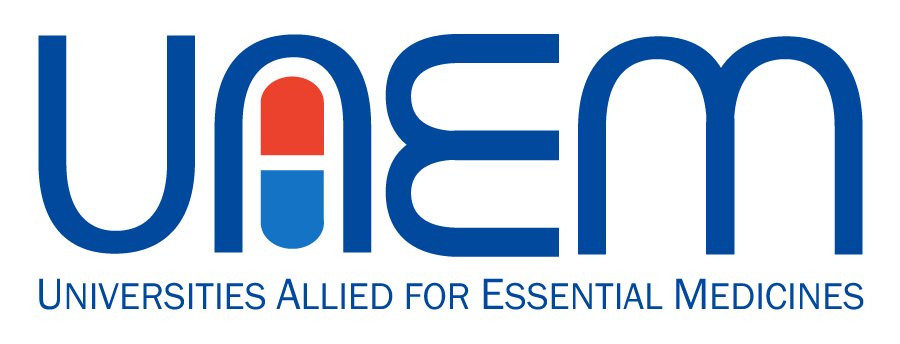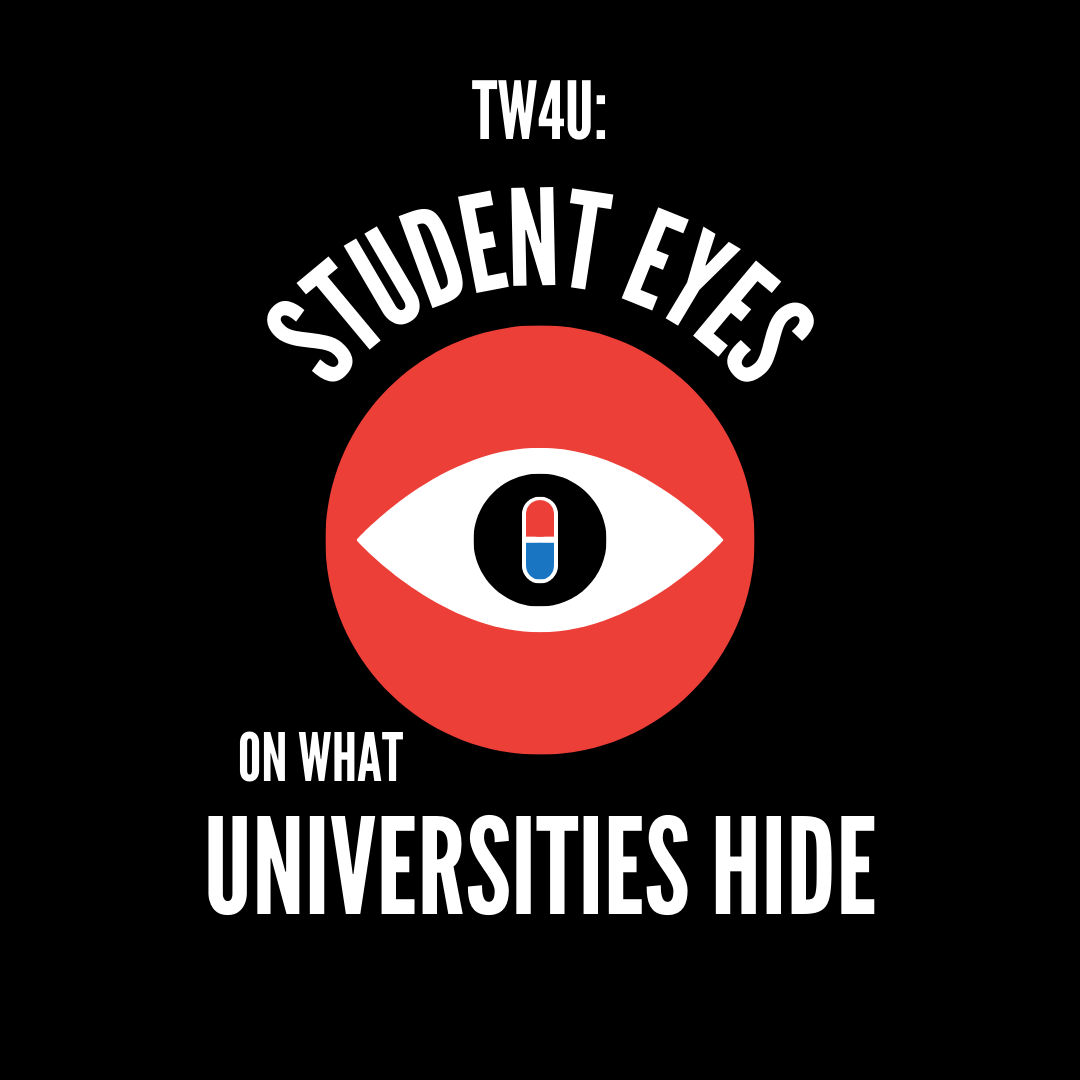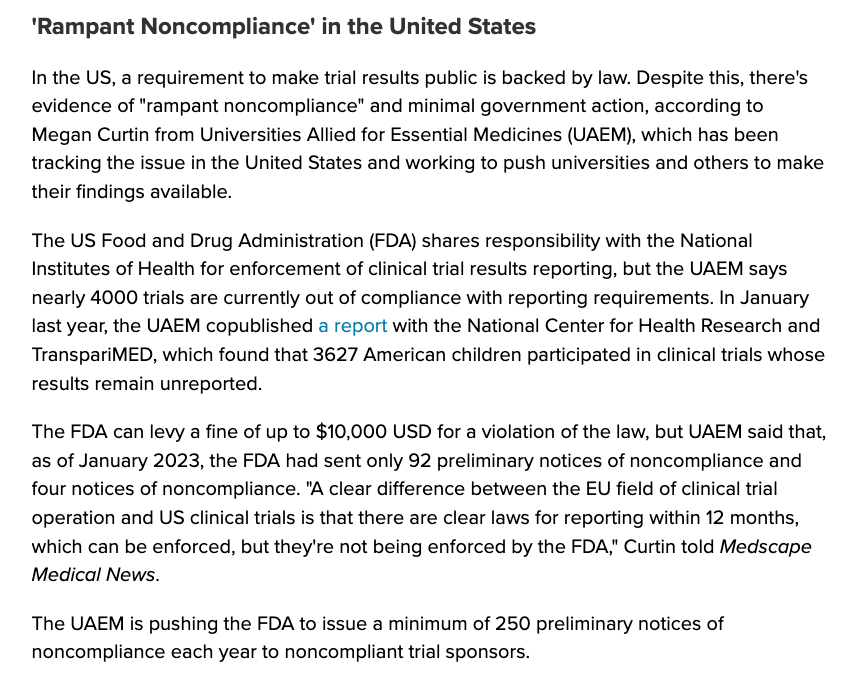UAEM NORTH AMERICA FILES CITIZEN PETITION TO PUSH FOR ENFORCEMENT OF THE FDAAA
The FDA and NIH share responsibility for enforcement of clinical trial results reporting requirements under the Food and Drug Administration Amendments Act of 2007 (FDAAA).
FDA evaluates potential violations of the law, issues Preliminary Notices of Noncompliance (i.e. Pre-Notices) to trial sponsors, and after 30 days, may issue a formal Notice of Noncompliance. The FDA can levy a fine of up to $10,000 for a violation of the law, and if a sponsor has not corrected the issue after 30 days have passed from receipt of a Notice, the FDA can continue to levy penalties of up to $10,000 for each day a sponsor remains in violation.
On February 27, 2023, UAEM filed a citizen's petition to demand the FDA enforce this critical law. See our Press Release, Final Citizen's Petition, and view slides from our recent Briefing on the UAEM Citizen's Petition.
The current state of compliance with clinical trial results reporting is hugely deficient.
Nearly four thousand trials are currently out of compliance with reporting requirements. Our 2019 report found that only 13 of the top 40 research universities in the United States were legally compliant with FDAAA. Even after advocacy at these universities by UAEM raised the number of 80% compliant institutions from 16 to 36 by 2021, only 17 of the 40 universities were fully compliant with the law. FDA Commissioner Robert Califf has highlighted the problem of noncompliance with FDAAA reporting requirements, warning of the biases that arise from “selective outcome and adverse event reporting.” In January 2023, UAEM co-published a report with the National Center for Health Research and TranspariMED, which found that 3,627 American children participated in clinical trials whose results remain unreported.
Noncompliance with the law has serious consequences for patients and providers.
Commissioner Califf has called results reporting “fundamentally an ethical issue.” A lack of reporting can distort the medical literature, force patients to pay high prices for new medicines without an opportunity for their physicians to review the data, and prevent trial participants from accessing research they made possible. The latter issue is even more serious when trial subjects come from vulnerable groups, such as children.
The FDA’s enforcement of FDAAA has been minimal and unfocused.
As of January 2023, the FDA had sent only 92 Pre-Notices and 4 Notices of Noncompliance. FDA has never filed any monetary fine against a noncompliant sponsor. The FDA has not sent any Pre-Notices to the NIH, which sponsors a large number of clinical trials, many of which are noncompliant with FDAAA. Yet, enforcement significantly increases compliance. As of August 17, 2021, all but 5 of the known 57 Pre-Notice recipients had reported missing information to ClinicalTrials.gov. The 4 Notices of Noncompliance issued to date have been 100% effective in compelling compliance.
The FDA should take the steps recommended in UAEM’s petition to improve enforcement.
The FDA should send a minimum of 250 Pre-Notices each year to noncompliant trial sponsors, in order to ensure that the level of enforcement better matches the scope of the problem.
These Pre-Notices should be made available via a public dashboard, in order to increase public accountability and transparency.
FDA should be more stringent in disseminating Notices of Noncompliance to sponsors who are nonresponsive to Pre-Notices.
FDA should issue new guidance with a prioritization framework that emphasizes trials relevant to high-risk and/or marginalized patient groups and for therapies without available alternatives.
The Latest
2021 Report:
In May 2021 UAEM North America launched its latest report Clinical Trial Transparency at U.S. Universities: A New Report Measuring Legal Compliance with Clinical Trial Reporting Obligations in 2021 which studies clinical trial reporting data from the top 40 U.S. research institutions (both public and private). And, there is some encouraging news! We have been able to measure significant progress made by many leading universities in this area over the last two years due in part to advocacy by UAEM and our allies in this area. There are some repeat worst offenders however including: the University of Colorado, Denver, University of Washington, New York University Langone Health, University of Cincinnati, and Stanford University.
Successes highlighted in the report include:
the increase in number of research institutions legally compliant under FDAAA (100% of clinical trials reported) from 13 to 17,
the increase in total number of registered clinical trials from 446 to 1516 between February 2019 and February 2021,
The decrease in total number of unreported trials from 138 to 101.
OPEN LETTER TO THE FDA COMMISSIONER - THE HON. ROBERT M. CALIFF
On April 21, 2022, UAEM sent an open letter to Robert M. Califf, the newly appointed U.S. Food and Drug Administration (FDA) Commissioner calling his leadership to attend with real urgency to the significant but so far underserved issue of clinical trial registration and results reporting.









